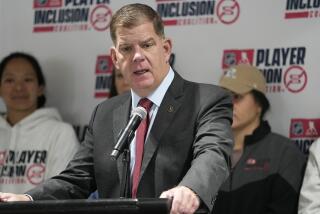NHL talks take a recess after more discussion of secondary issues
NHL labor negotiations continued at a glacial pace Sunday, with non-core issues again taking precedence as the league and the players’ union met for the third straight day. They decided to not to meet again Monday and will instead use the time for internal discussions.
The leaders of each side, NHL Commissioner Gary Bettman and NHL Players’ Assn. Executive Director Donald Fehr, weren’t involved in Sunday’s talks at the league’s Manhattan offices. That meant only lesser matters were being discussed, as opposed to the major differences that have left a huge gulf that threatens to swallow part or all of the season.
By the time the groups meet again, it is likely the NHL will have postponed the start of the season. The opener is scheduled for Oct. 11, but an on-time start is virtually impossible without a collective-bargaining agreement in place this week along with a timetable for a short training camp and a few exhibition games. The lockout imposed by the NHL on Sept. 15 has already wiped out the exhibition schedule.
A full season could still be played by condensing the schedule and playing deeper into June, as happened after the lockout that cut the 1994-95 season to 48 games per team. But even that possibility would vanish if there’s no settlement by early November.
Steve Fehr, Donald Fehr’s brother and the NHLPA’s special counsel, told reporters in New York that Sunday’s topics included health and safety matters, drug testing, medical care and player movement. The latter area has been a source of contention. The NHL has proposed extending entry-level contracts from three years to five or more and limiting free agency to players who have accrued 10 years’ experience. The NHLPA opposes both of those concepts.
“It was a productive day. We made some progress in some areas,” Steve Fehr said. “I would say it’s good that we were talking. It’s true that we could’ve done this last week or a week before or a week before that, but it’s a lot better than doing it three weeks from now.”
NHL Deputy Commissioner Bill Daly maintained the league’s position that the union has not made enough economic concessions for negotiations to gain serious traction.
“I hate to sound like a broken record, but we need some movement on the economic issues. We need some movement on the system issues,” Daly told the Associated Press. “We need them to be scheduled as the subject of a meeting, and right now the union is not prepared to do that.”
Daly said a lot was accomplished the last few days but added, “I don’t think any of that is going to get a deal done. But they are all necessary elements of the deal.” He said each side has “homework projects to do and drafts we owe each other on certain things,” and so would take Monday to accomplish that.
No additional talks have been scheduled.
ALSO:
Updated Stanley Cup has a surprise name: Ed Roski
Economic issues emerge as sticking points in labor talks
Some questions and answers as the NHL lockout continues
More to Read
Go beyond the scoreboard
Get the latest on L.A.'s teams in the daily Sports Report newsletter.
You may occasionally receive promotional content from the Los Angeles Times.











